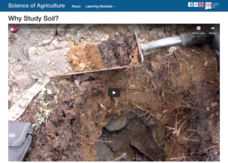Mathispower4u
Determine Function Values for a Piecewise Defined Function (Example)
Determine the equation to use in evaluating a piecewise function. Learners watch a video on evaluating a piecewise function. They confirm the equation to use based on the domain and then use substitution to find the value of the function...
Mathispower4u
Graphing Piecewise Defined Functions
Only choose the pieces needed. Pupils learn a way to graph piecewise functions by graphing the entire function and then only keeping the section of the graph that belongs to the piecewise function. The Mathispower4u video shows...
Mathispower4u
Interpreting and Graphing Piecewise Functions
Learn how to graph a function that is in pieces. The Mathispower4u Algebra I Video interprets the graph of a piecewise function that represents a cellphone plan. Pupils use the graph to determine the cost for a given number of units...
Mathispower4u
Determine a Basic Piecewise Defined Function
Not all functions have the same equation throughout. Learners see a word problem that requires more than one equation to model the situation. The video from the Mathispower4u Algebra 1 series introduces the concept of piecewise defined...
Mathispower4u
Determine Symmetry about the x-axis, y-axis, and the Origin (Example)
Symmetry shows up in equality. Pupils view four examples as the presenter determines whether the equations have symmetry about the x-axis, the y-axis, and the origin. Each equation has at least one type of symmetry. The video works...
Mathispower4u
Symmetry Introduction: x-axis, y-axis, the Origin
You can flip them and the graph looks the same. An instructional video shows how to determine whether an equation contains a graph that has symmetry. Scholars learn how to calculate algebraically whether an equation has symmetry about...
Mathispower4u
The Difference Quotient (Quadratic Function) Example 3
Take an example out of more advanced math. Pupils observe how basic algebraic concepts help solve expressions from higher level math courses. The video from a Mathispower4u Algebra 1 series shows the evaluation and simplification of the...
Mathispower4u
The Difference Quotient (Quadratic Function) Example 2
Use a calculus concept to build algebra skills. A helpful Mathispower4u Algebra 1 video uses the difference quotient, a typical expression from calculus, to show different algebraic techniques. Pupils observe applications of function...
PBS
Should We Police Our Police? | America From Scratch
The increasing heated debate about policing in the United States triggers this episode from the PBS's "America From Scratch" series. After listening to arguments from many perspectives, viewers are asked to consider whether Congress...
PBS
What if There Were No States? | America From Scratch
Imagine there's no state borders, no California, no Pennsylvania, no Florida. This might be easy to imagine but very hard to do. A short PBS video asks the question, discusses the challenges, and suggests some alternatives to states that...
Mathispower4u
Polynomial Subtraction Application - Length (Example)
Cut a piece of molding by subtracting polynomials. Pupils watch a video as the presenter works through an example of a word problem involving the subtraction of polynomials. The problem involves finding the remaining length of a piece of...
Mathispower4u
Adding and Subtracting Polynomials (Example)
Keep track of like terms. Pupils watch the presenter solve two polynomial problems, one addition and one subtraction. All terms in the problems do not have a like term partner. Scholars realize the importance of keeping up with each term...
Mathispower4u
Subtracting Polynomials (Example)
Distribute the negative one to subtract. Pupils watch a video that works through four examples of subtracting polynomials. The video starts with basic monomials, then moves into two binomials, and finishes up with trinomials. Each...
Mathispower4u
Adding and Subtracting Polynomials
Check that! The presenter works several polynomial addition and subtraction problems and shows pupils how to check the answer using the table function in a graphing calculator. By typing in the initial problem and the answer in the...
Mathispower4u
Adding and Subtracting Polynomials
Realize that adding and subtracting polynomials is nothing really new. An informative video shows how to clear the parentheses when adding and subtracting polynomials to then solve by combining like terms. Learners watch three different...
TED-Ed
Epic Engineering: Building the Brooklyn Bridge
Sometimes bridge building is a family business. An enlightening video describes the construction of the Brooklyn Bridge and the engineering principles behind suspension bridges. Viewers also learn about the people who led the project,...
TED-Ed
The Tower of Epiphany | Think Like A Coder, Ep 7
Let coding save the world. As part of her quest, the hero of the series must retrieve the Node of Creation from the Tower of Epiphany. This requires solving a computer programming puzzle to determine the energy needed to fill a basin...
New Mexico State University
Runoff and Infiltration
Soil infiltration has less to do with the soil than what is covering the soil. A quick video presentation demonstrates how different soil samples use water. The instructor takes note of both the infiltration demonstrated by each sample...
TED-Ed
The Chasm | Think Like A Coder, Ep 6
It'd be a shame if the hero fell into the chasm. The saga of the hero trying to save the world continues, this time requiring a bridge to cross a ravine. The blocks for the bridge must form a palindrome, and the hero must program a robot...
TED-Ed
The Artists | Think Like A Coder, Ep 5
Create a diversion! Continuing the quest to save the world, the hero of the series needs to find an artifact inside a tower. To distract the guards, she programs a robot to vandalize some artwork. Viewers learn how to apply loops and...
TED-Ed
The Train Heist | Think Like A Coder, Ep 4
Robots come in handy when planning a train heist. The hero and her robot continue their quest to find artifacts to save the world. They must locate and steal the Node of Power on a specific car of a train by writing computer code for the...
TED-Ed
How Close Are We to Uploading Our Minds?
What would it take to digitally upload someone's mind? A fascinating video first describes how a brain works, then looks at a future where people can live forever through avatars. The video describes the required technological advances...
Learning Games Lab
Understanding the Major
The purpose of university courses is not always clear. A comprehensive video presentation explains the importance of a well-rounded education and a complete college experience. Professionals discuss how their post-secondary educations...
Learning Games Lab
Why Study Soil?
Some scientists spend their entire careers analyzing and learning about soils. An interesting video lesson provides an overview of what soil scientists do and why. Pupils learn how soil analysis connects to other branches of science...























